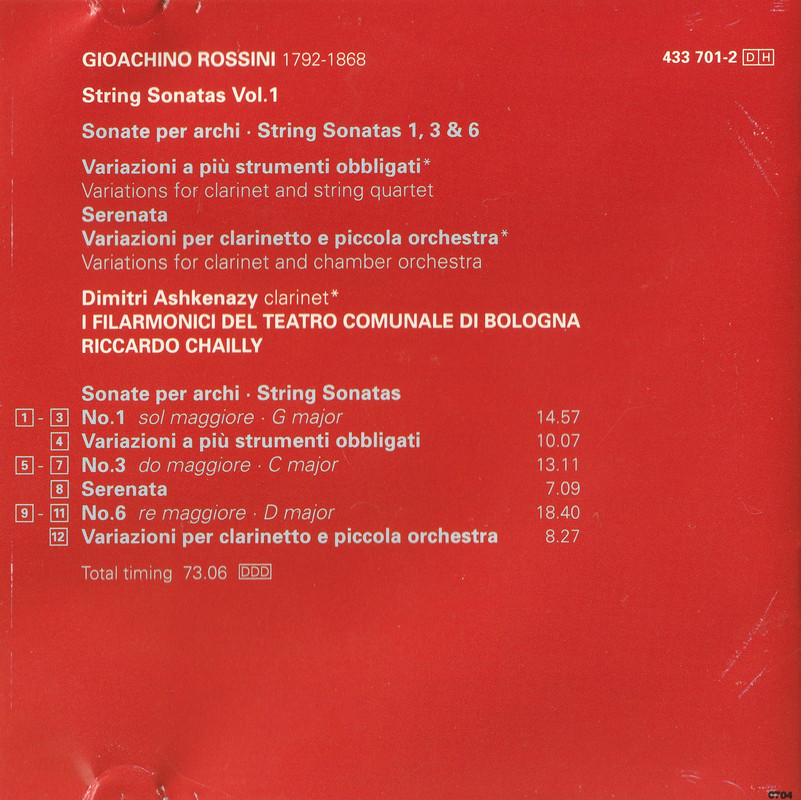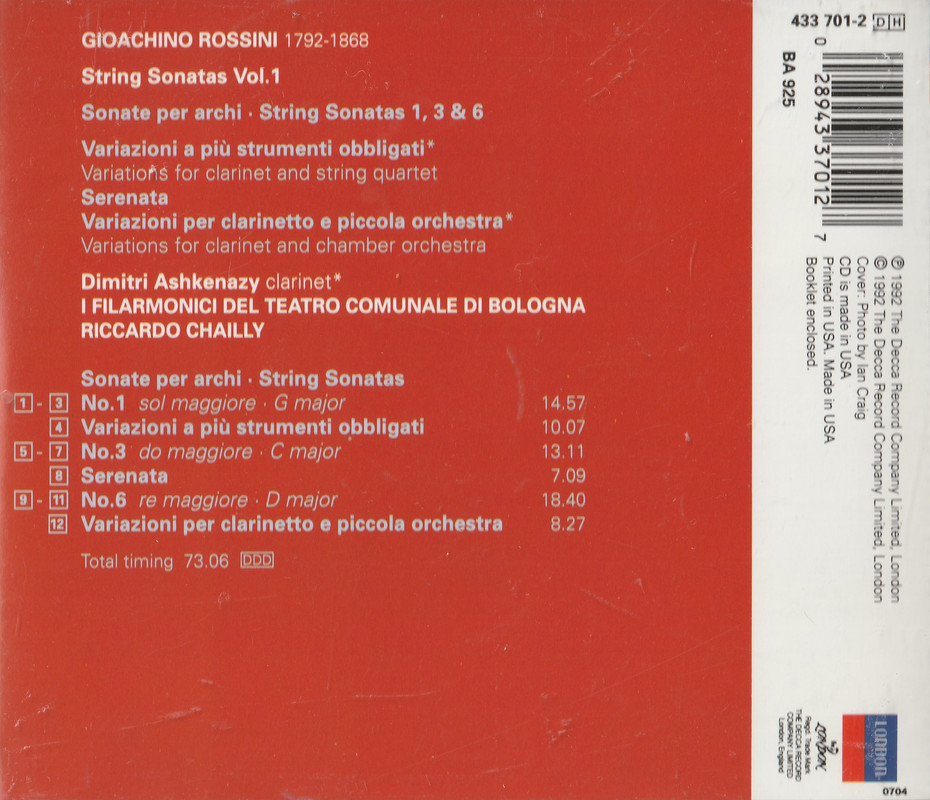Chailly's 'Third Way' in Rossini
Something started to rub me the wrong way when I listened to this recording.
And no...it wasn't the cat.
Rossini writes these String Sonatas for divided violins, cello, and double bass. So at first, I thought it was the lack of violas, missing a bit of the middle ensemble.
No, it seemed to lay with the violins. They sounded rather pitchy of ensemble, as well as strident and edgy. I have heard this Bologna ensemble before with Chailly at the helm, and I know they are a talented group, so something else was off.
Perhaps it was Decca's sonics in the old Bologna church, but it eventually dawned on me that the string players were reducing their vibrato on modern instruments. Ah yes... Chailly's Third Way. This is the conductor's way of providing the listener with a period influence, but on modern instruments. It just sounds wrong here for some reason, where I have mildly enjoyed it in the past.
Again, the violins sound wheedly, and it affects their ensemble and section tuning, particularly when they play above the staff. There are a few moments where I hear the lessened vibrato in the cello, but was not as negatively affecting on me.
I'll come back to this, but a bit about the works. Rossini's six Sonatas for Strings are works of youth (age 12!), akin to Mendelssohn's String Symphonies, although I find the latter more experimental on that composer's part. No surprise that Rossini sounds strongly of the Classical Era here, and his musical language is rather simplistic.
The works are charming, where their most shining attribute is how Rossini shares the love across all of the instruments, particularly the oft-ignored double bass. Their structures are simple, each with three movements (fast - slow - fast), where the opening movement is traditionally longer, a lyrical middle movement, and a light-hearted, faster final movement. If comparing recordings, be aware Chailly takes every exposition repeat, whereas others do not.
Most striking is the final movement of SS6, 'Tempesta'. Yes, it is a storm setting with plops of raindrops, lightning, thunder, and such. Here it sounds awfully like the Baroque, but it is a nice bit of programmatic music.
The six sonatas come in many versions. The original for string quartet (using the two violins, cello, and double bass), string orchestra (as on this recording), wind quartet (flute, clarinet, bassoon, and French Horn), and a version for a typical string quartet (two violins, viola, cello). I wouldn't be surprised if there were many other forms too!
Chailly and the Bologna Community Theatre Philharmonic Orchestra play the full string orchestra version. I think I might prefer its original version with four instruments, for the playing gets a little thick when the string multiply (17 players on this recording). Even the wind quartet version is clearer in texture. This first Decca volume (of two, the second of which I will also cover) includes Sonatas 1, 3, & 6.
As a bonus, though, we get three works for orchestra with winds. The Serenata is lovely; it is written for string quartet, here enlarged for string orchestra, plus flute, clarinet, and English Horn. It is essentially a variation / fantasia sort of work as well, and each instrument gets a showcase.
Additionally, a Variations for Clarinet (in C Major) puts the instrument through the wringer, and a Variations for Obbligato Instruments (including Clarinet and also in C Major) spreads the variations to feature all of the instruments as well.
So where do I stand with this recording? For the Sonatas for Strings, if you enjoy the string orchestra version, this performance could be OK if you like modern strings sapped of vibrato, but I think I would recommend searching out Neville Marriner on Praga, which has all six on one disc. But, I do like the additional variation works, where the presence of winds creates some well needed variety.
I think I am undecided. I want to like it, but there are aspects which both please and displease my ears.
Listen on YouTube
Works
String Sonata 1 in G Major (14.57)
String Sonata 3 in C Major (13.11)
String Sonata 6 in D Major (18.40)
Serenata in E-flat Major (7.09)
Variations for Obbligato Instruments (10.07)
Variations for Clarinet (8.27)
Soloists
Dimitri Ashkenazy, clarinet
Performers
Bologna Community Theatre Philharmonic
Riccardo Chailly, conductor
Label: London / Decca
Year: 1997
Total Timing: 72.31
It is good to be familiar with these early pieces from Rossini, even if I might prefer them in other forms.
It was a long journey as to what bothered me about the sound from Bologna, but I eventually put my finger on it.
Some may like it, but I am mixed. The clarinet and wind features are excellent additions.
Find more Rossini recordings HERE!



Comments
Post a Comment